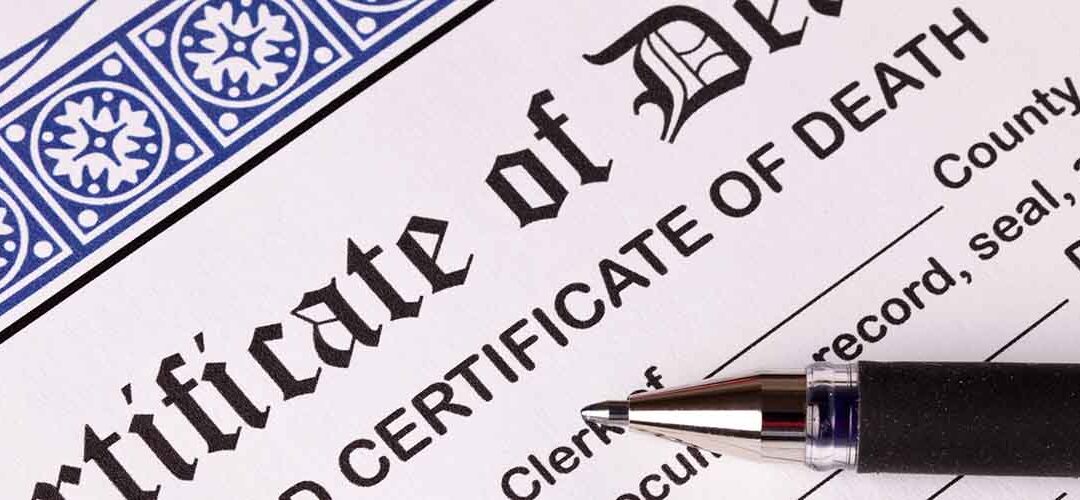What is a certificate of death?
A certificate of death is a legal document issued by a government agency, usually your state or local government, legally declaring someone’s death. The process is usually started by the funeral director and the form has to be signed by a doctor with additional information before being sent to the government for processing. Here in California, death certificates are issued by the California Department of Public Health. Rather like a birth certificate, you must apply for certified copies of a death certificate to make needed legal changes.
To apply for these copies in California, you have to pay $24 per needed copy. The required form can be filled out electronically or through a printed and mailed sheet. Without a death certificate, legal processes are halted and the closure of accounts and distribution of assets can be significantly delayed until they have the certificate of death in hand. As it can take up to several weeks between someone passing and the copies being ready, it is best to request them as soon as possible.
How many death certificates do I need?
When a loved one passes away, the executor of the estate must apply for several certified copies of the death certificate before taking legal action to close the estate. While some organizations require you to turn in a certified copy of the death certificate, others may accept a photocopy. Before ordering the certified copies, check with all the organizations beforehand to see how many you actually need to have in hand. It may be a good idea to also order one or two extras for your records so you have them ready in case something unexpected comes up.
Who will need a copy of the certificate of death?
From legal matters to financial affairs, the need for death certificates spans across different sectors. Depending on the situation of the person who passed away, you may only need to contact a few of these or many of them might apply and you will need to go carefully through your loved one’s records to know who you need to get a hold of.
- Probate Court: To process the will in probate court, the court needs the legal certificate of death to start the process of closing out the estate and distributing the assets to any beneficiaries.
- Lawyers, Estate, and Trustee Offices: People legally handling the estate and distributing the funds need to have the certificate of death to start the process and read the will.
- Social Security Administration: The Social Security Administration needs a death certificate to update their records, stop any direct payments, and start survivor’s benefits to others if applicable. This also prevents fraud by preventing a living person from illegally using the social security number of a person who has passed away.
- Insurance Companies: Insurance companies such as for home, life, auto, health, and property, need a death certificate to process claims related to the policyholder. Life insurance policies will need the certificate of death before making any payments to beneficiaries. A health insurance company may request one before removing the person from the plan and adjusting coverage for other family members.
- Financial Institutions and Creditors: Banks, credit unions, and other financial institutions usually require a death certificate before they will close accounts, settle debts under that individual’s name, and transfer the funds so the estate can be liquidated by the executor of the estate. Types of accounts can include checking, savings, credit cards, investments, and safe deposit boxes.
- Government Agencies: In addition to the Social Security Agency, there are numerous government agencies that need the certificate of death to close accounts. This includes the IRS (the executor has to file the last year of taxes), the property records office (to transfer land titles), the DMV (to cancel the driver’s license and transfer any vehicle titles), U.S. Post Office (to forward mail), and the passport office (to cancel the passport).
- Health Care Facilities and Practitioners: Health facilities such as doctors’ offices, hospitals, and nursing homes may request the certificate of death for their records.
- Employers and Pension Providers: Employers and pension providers will need the certificate of death to stop employment benefits and pay out any survivor benefits or pension distributions.
- Veteran’s Affairs: The Veteran’s Affairs office will need the death certificate to issue any applicable benefits to beneficiaries after a veteran has passed away.
Though requesting a certificate of death and filling out needed paperwork at various organizations and agencies can seem like a huge hassle, especially when you are grieving a recent loss, they are important steps to take in the closing out of an estate and making sure money is paid out to any beneficiaries. Requiring this proof is also a way agencies prevent identity theft and make sure only authorized executors are the ones who can make any changes to accounts after someone has passed away so the wishes and memories of the departed are honored.

